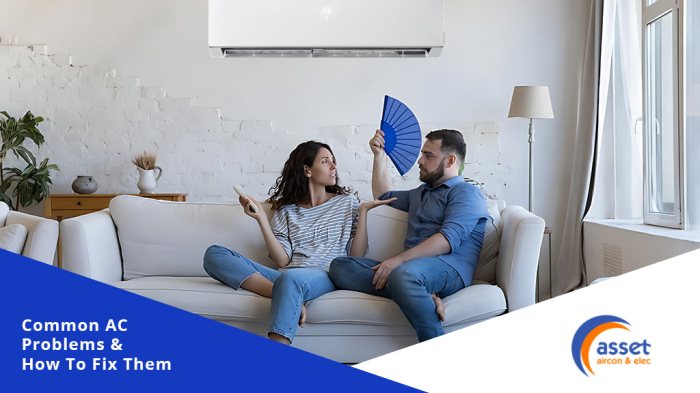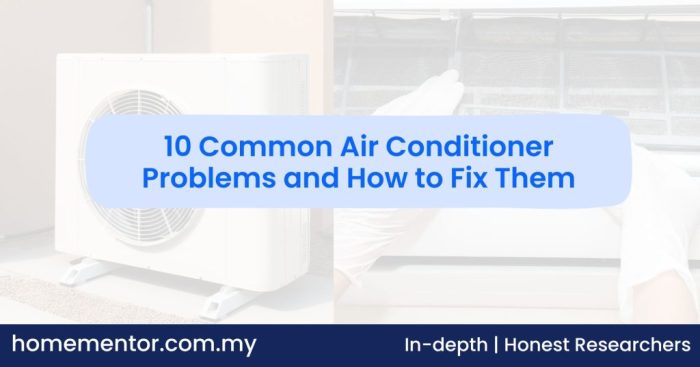As Common air conditioner problems and how to fix them takes center stage, this opening passage beckons readers with casual formal language style into a world crafted with good knowledge, ensuring a reading experience that is both absorbing and distinctly original.
Air conditioners are a vital part of keeping our homes comfortable, but when issues arise, knowing how to fix them is crucial. In this guide, we will delve into the common problems faced by air conditioners and provide practical solutions to ensure your cooling system runs smoothly.
Common Air Conditioner Problems
Air conditioners can face various issues that affect their performance and cooling efficiency. Identifying these common problems early on can help prevent major breakdowns and costly repairs.
Refrigerant Leaks
Refrigerant leaks are a common problem that can lead to decreased cooling efficiency. Signs of a refrigerant leak include warm air blowing from the vents, ice buildup on the coils, and a noticeable decrease in cooling capacity.
Dirty Filters
Dirty or clogged filters can restrict airflow, causing the air conditioner to work harder to cool the space. This can lead to increased energy consumption and reduced cooling efficiency. Symptoms of dirty filters include reduced airflow, increased dust in the air, and uneven cooling.
Faulty Thermostat
A faulty thermostat can cause the air conditioner to run erratically or not turn on at all. This can result in uneven cooling and discomfort in the living space. Signs of a faulty thermostat include temperature fluctuations, inaccurate readings, and the inability to adjust settings.
Refrigerant Leaks

Refrigerant leaks in an air conditioner can lead to inefficiency and potential health hazards. Detecting and fixing these leaks is crucial for the proper functioning of the unit.
How to Detect Refrigerant Leaks
One common sign of a refrigerant leak is reduced cooling capacity. If you notice that your air conditioner is not cooling as effectively as before, there might be a leak. Another indicator is a hissing or bubbling noise coming from the unit.
Additionally, ice buildup on the refrigerant line or coils can also point to a leak. You may also detect a sweet, pungent odor near the unit, which is a characteristic smell of refrigerant.
Potential Dangers of Refrigerant Leaks
Refrigerant leaks can pose health risks, as exposure to these chemicals can cause headaches, dizziness, and respiratory issues. Moreover, refrigerant is harmful to the environment, contributing to ozone depletion and global warming.
Methods for Fixing Refrigerant Leaks
- Firstly, locate the source of the leak by inspecting the refrigerant lines and connections.
- Once the leak is identified, it is essential to repair it using a suitable sealant or by replacing the damaged component.
- After fixing the leak, the refrigerant needs to be recharged to the appropriate level by a professional HVAC technician.
- Regular maintenance and inspection of the air conditioner can help prevent future leaks and ensure efficient operation.
Frozen Evaporator Coils
When the evaporator coils in an air conditioner become frozen, it can lead to various issues with the cooling system. Understanding the causes, consequences, and steps to fix frozen evaporator coils is essential for maintaining the efficiency of your air conditioner.Frozen evaporator coils in an air conditioner can be caused by restricted airflow, low refrigerant levels, or a malfunctioning blower motor.
When the airflow is restricted, such as due to a dirty air filter or blocked vents, the coils can get too cold and freeze up. Low refrigerant levels can also cause the coils to freeze as the system struggles to absorb heat efficiently.
A malfunctioning blower motor can lead to inadequate air circulation, resulting in the coils becoming too cold.Neglecting frozen evaporator coils in an air conditioner can lead to reduced cooling efficiency, increased energy consumption, and potential damage to the compressor. When the coils are frozen, the air conditioner will struggle to cool the air effectively, leading to longer running times and higher energy bills.
If the issue is not addressed promptly, the compressor may be at risk of damage, requiring costly repairs or even replacement.
Defrosting and Fixing Frozen Evaporator Coils
To defrost and fix frozen evaporator coils in an air conditioner, follow these steps:
- Turn off the air conditioner to allow the coils to thaw naturally.
- Check and replace the air filter if dirty or clogged.
- Ensure that all vents and registers are open and unobstructed to promote proper airflow.
- If the refrigerant levels are low, contact a professional HVAC technician to recharge the system.
- Inspect the blower motor for any malfunctions and repair or replace as needed.
- Once the coils are thawed, turn on the air conditioner and monitor for any signs of refreezing.
- If the issue persists, seek the assistance of a qualified HVAC technician to diagnose and resolve the underlying cause of the frozen coils.
Sensor Issues
Malfunctioning sensors can significantly impact the performance of an air conditioner. These sensors are responsible for detecting the temperature and sending signals to the unit to adjust accordingly. When sensors are not functioning properly, the air conditioner may not cool or heat the room effectively, leading to discomfort and inefficiency.
Recalibrating or Replacing Sensors
If you suspect that the sensors in your air conditioner are not working correctly, you can try recalibrating them before considering a replacement. To recalibrate the sensors, follow these steps:
- Turn off the power to the air conditioner.
- Locate the sensor near the evaporator coil and gently adjust its position if needed.
- Use a soft cloth to clean the sensor and remove any dust or debris that may be affecting its performance.
- Turn the power back on and observe if the air conditioner is functioning better.
If recalibrating the sensors does not resolve the issue, you may need to replace them. It is essential to consult a professional HVAC technician to ensure the sensors are replaced correctly and are compatible with your air conditioner model.
Importance of Sensors
Sensors play a crucial role in maintaining the optimal performance of an air conditioner. They help regulate the temperature inside the room by signaling the unit to adjust the cooling or heating output. Without properly functioning sensors, the air conditioner may run continuously without achieving the desired temperature, leading to energy waste and potential damage to the unit.Regular maintenance and inspection of the sensors are essential to ensure they are working correctly.
By keeping the sensors clean and calibrated, you can prolong the lifespan of your air conditioner and enjoy efficient cooling or heating throughout the year.
Clogged Air Filters
When it comes to your air conditioner, clean air filters play a crucial role in maintaining optimal performance. Clogged air filters can lead to a variety of issues that can impact both the indoor air quality and the efficiency of your system.
Checking and Replacing Clogged Air Filters
Regularly checking and replacing clogged air filters is essential to ensure that your air conditioner functions properly. Here are some methods to help you with this process:
- Check your air filters monthly and replace them if they appear dirty or clogged.
- Follow the manufacturer's recommendations for the type of air filter to use and how often to replace it.
- You can also consider investing in high-efficiency filters that can trap more particles and improve indoor air quality.
Impact on Indoor Air Quality and System Efficiency
Clogged air filters can have a significant impact on both indoor air quality and system efficiency. When air filters are clogged, they restrict airflow, causing your system to work harder to maintain the desired temperature. This can lead to increased energy consumption and potentially higher utility bills.
In addition, clogged air filters can also contribute to poor indoor air quality by allowing dust, dirt, and other contaminants to circulate throughout your home.
Final Wrap-Up

In conclusion, understanding the common air conditioner problems and how to fix them is essential for maintaining the efficiency and longevity of your cooling system. By being aware of these issues and knowing how to address them effectively, you can ensure that your air conditioner continues to keep you cool and comfortable, especially during the hot summer months.
Common Queries
How often should I change my air filter?
It is recommended to change your air filter every 1-3 months, depending on usage and the type of filter you have. This helps maintain good indoor air quality and ensures your system runs efficiently.
What are the signs of a refrigerant leak?
Signs of a refrigerant leak include reduced cooling capacity, hissing sounds, ice buildup on the refrigerant line, and higher electricity bills. If you notice any of these signs, it's important to address the issue promptly.
Why is it important to defrost frozen evaporator coils?
Defrosting frozen evaporator coils is crucial as it restores proper airflow and prevents further damage to your air conditioner. Neglecting this issue can lead to more serious problems down the line.











